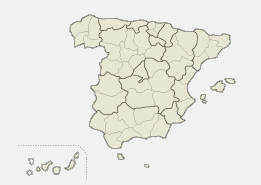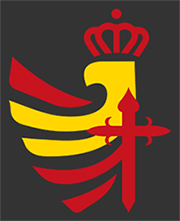We are all one
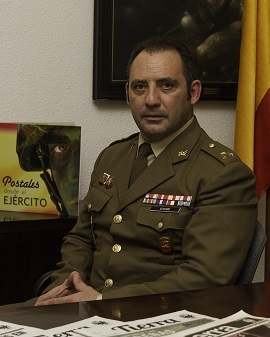
The current Captain Guisado.
When Second Lieutenant Jacinto Guisado was ordered to relieve the Infantry section in Najaf, he knew that it was not the turn of his weapons section, but issues of guards and fate, that never stays calm, took everyone to meet a destiny they did not expect. For them, the Al Andalus base in Najaf involved resting, they could keep standing watch for many hours, and they could provide security in a small and calm base. They called it ‘the spa’, because during that week their task would be to watch guard in four-hour turns, some casual escorting, and they would have the rest of the time to do sport and rest.
Guisado’s section heads to Najaf
Towards the spa travelled sergeants Lorenzo, Pinto and Galán, first officers Delgado, Moisés, Benítez and Bolaño, corporals Guadalupe Pulido, Blanco and Pavón, soldiers Méndez, Sandra Duque, Saueceda, Acevedo, Monge, Barco, Villarrubia, Suárez, Parra, Cuenca, Boza, Justo, Luna, Caballero, Nápoles, Blas and Jorna; and second lieutenant Guisado.
When reaching Najaf they revised the defence plan of the base so, in case of alarm, nothing could disperse in the fog or with the fire, and once the shifts of the guards were stablished, in that border of air and sand, whoever was able went to rest.
They did not know that on that day, 3rd April 2004, nothing was the same, since the Americans had arrested Muqtada Al Sadr’s second-in-command, imam Al Yaqubi. So, while the section rested from the operations of the previous day, there was a huge demonstration at the gates of the base, headed by Al Yaqubi’s wife. He wanted to give clothes and belongings to his arrested husband and demand his freedom. However, the Spaniards were unaware of this arrest. They were told that he was not there, and the Spanish troops had nothing to do. Just in case, the section deployed as a show of force. They left, but said that they would demonstrate the following day.
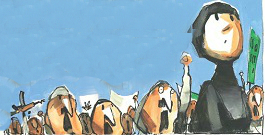
There was a demonstration at the gates of the base, sketch: Esteban
Attack to the base of Najaf
On the morning of 4th April, Sunday, the attack began. First officer Cortés entered the premises shouted: ‘They are attacking us!’ Jacinto jumped out of the bunk bed, he put on his trousers, his boots with the laces half-tied, he put on his vest and ran to his position. The section had deployed according to the security plan, and it was receiving a lot of fire, both from fussiles and from RPG rockets. When it did not crash into the walls, it passed whistling over their heads while the sand, far from resting, was moved by the boots of all the soldiers who rushed to the call to arms.
They managed to repel the first attack. In the middle of that defence, by radio, Jacinto receives colonel Asarta’s order to head to a camp nearby where Salvadorian soldier were instructing ICDC, the new Iraqi defence organ. Jacinto transmitted the order to his sergeants, Lorenzo, Pinto and Galán; and contacted the captain who was in command of that camp. Meanwhile, the defence of the base was restablished by the Cavalry Exploration Vehicles, commanded by captain Placer. The precision shooter of the section, first officer Benítez, remained positioned at the roof of the base, to support the exit with fire.

The base of Najaf suffered a severe attack. Sketch: Esteban
Rescue mission
They were receiving attacks from everywhere. They could not go out using the main gate, so they did it through the southern area of the base, which forced them to cross the whole town. They moved as pieces made of steel with an only assembly, combatting fire with fire and bravery with bravery. With lots of effort and combing all possible areas, thay managed to cross the city and reach the entrance of the IDC building and the adjacent building, the prison, which was completely surrounded. The section placed forming a line and, with heavy fire, they managed to raise the siege, entering by force, reaching the rear of the yard..
Leaving behind the clamour of the battle and the dust raised by the vehicles, the situation inside was very complex, with dead and wounded people. On the way, they had supported a Salvadoran section that was trying to walk to the prision to help their partners, since they knew that many of them were in danger. However, it was quickly surrounded by a much larger number of armed people wh put them in trouble. They supported them with fire and left them in a safer place with the promise of picking them up later. ‘We’ll come back for you, resist here!’
Inside the ICDC building, while they took out of the vehicles as much as they could to be able to load the wounded people on stretchers, the situation was reassessed. They were seriosuly injured, and the Salvadoran captain asked second lieutenant Guisado to transport them quickly, and not to forget about them. Jacinto said goodbye to him with a confident greeting. The section personnel was lined up as they had practiced a thousand times, in a routine that sometimes could seem boring and banal, but now was instinctive.
They all covered their sectores. They walked the way back, shooting at all the mouths of fire that were attacking them, keeping in their hearts that tradition of bravery that only poems and paintings are able to describe. They quickly entered the base, and after leaving the injured at the first-aid post, they went back to their deployment positions and reported the news.
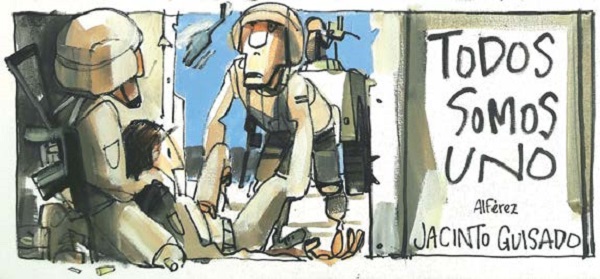
The Salvadoran partners were in a worrying situation. Sketch: Esteban
Second journey to hell
The colonel asked Jacinto how many people were in jail. When anaswering that almost a hundred, he was ordered to go back and take them out. Go back again. Go back to the light and the shadows of the battles that now was Najaf, a real battle. Jacinto looked at his men and women knowing that he was going to ask them to go back to combat, back to an already-known place now filled with shrapnel, where something more than courage was needed, and needless to say they had it: training and discipline.
They had to load ammunition again, since they had used all the magazines they had. Sergeant Pinto and corporal Acevedo went to get ammunition. The Cavalry VECs gave them 7.62 cartridges for the machine guns. They had already crossed the city once, they had combatted without leaves, they had broken the siege and had come back with injured people who had saved their lives. Now, they must walk along the same path, which is as impenetrable as the first time, but already familiar to them in terms of effort and danger.
Jacinto approached his men and women and said to them: ‘We must go out again.’ He smiled when, seeing their faces, he only heard two words: ‘yes, sir.’
With the same smell of diesel oil, braking and hit cartridges, and the same sound of hundreds of bounces in the armoured vehicles, the ground and some RPGs that flew over their heads, while the machine guns were hitting all the rooftops. That is how, once again, they crossed the town and broke the siege. They took all the people out of the ICDC building, but second lieutenant Guisado still had to pick up part of the Salvadoran section who defended bravely on the street, despite being completely surrounded.
They had to leave the jail with they convoy. Jacinto was at the vanguard, and sergeant Lorenzo in the rear. The ramps in the BMRs were down to allow them to get the Salvadoran soldiers into along the way, as they shot the enemies who were attacking them. All of a sudden, two Apache helicopters appeared, facilitating the way back. As they moved, Jacinto spotted a man falling from a rooftop with a RPG rocket on his shoulder, about to make fire on the convoy. He looked back and saw soldier Monge combing the rooftop with this machine gun. ‘We are all one—he thought—, mi section is the best in the world’ and the cheered up when he saw the gates of the ‘Al Andalus’ base in Najaf so close. At last, they were back in the ‘spa’ again.
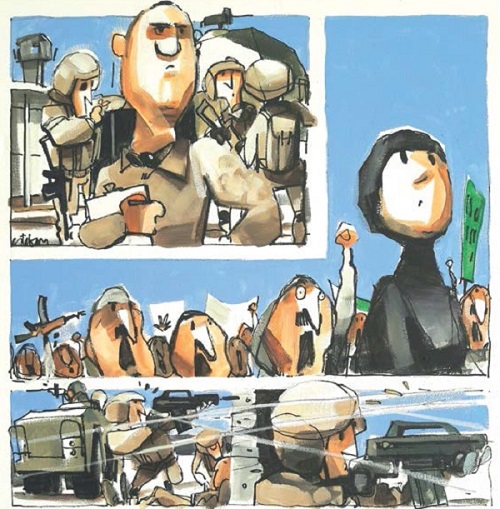
Interview to Captain Guisado
ARMY UNITS
- Araba Álava |
- Albacete |
- Alicante |
- Almería |
- Asturias |
- Ávila |
- Badajoz |
- Barcelona |
- Burgos |
- Cáceres |
- Cádiz |
- Cantabria |
- Castellón |
- Ceuta |
- Ciudad Real |
- Córdoba |
- A Coruña |
- Cuenca |
- Girona |
- Granada |
- Guadalajara |
- Gipuzkoa |
- Huelva |
- Huesca |
- Islas Baleares |
- Jaén |
- León |
- Lleida |
- Lugo |
- Madrid |
- Málaga |
- Melilla |
- Murcia |
- Navarra |
- Ourense |
- Palencia |
- Las Palmas |
- Pontevedra |
- La Rioja |
- Salamanca |
- Segovia |
- Sevilla |
- Soria |
- Tarragona |
- Santa Cruz de Tenerife |
- Teruel |
- Toledo |
- Valencia |
- Valladolid |
- Bizkaia |
- Zamora |
- Zaragoza
